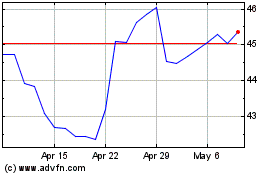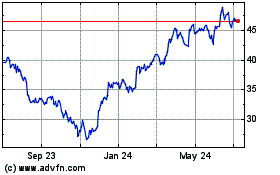By Mike Colias and Adrienne Roberts
President Trump's threat to impose escalating tariffs on Mexican
imports foists fresh bad news on the U.S. auto industry, which had
pinned hopes on a tentative deal reached last year to preserve free
trade between the countries.
For executives at Detroit's Big Three auto makers, the prospect
of tariffs on Mexican imports has been the most worrisome of the
trade threats leveled by Mr. Trump during his presidency.
Mexico-built cars accounted for 17% of Detroit auto makers' overall
U.S. sales in 2018, including some of the industry's biggest
moneymakers, large pickup trucks.
The tariffs also would hit non-U.S. car companies and automotive
suppliers. Overall, the U.S. imported $52.6 billion of vehicles and
$59.4 billion in auto parts last year from Mexico, the highest
totals of any country, according to Commerce Department data.
Mr. Trump on Thursday said the U.S. would implement a 5% tariff
on all Mexican imports June 10 if the country doesn't take steps to
stem the flow of migrants over the U.S.-Mexico border. That tariff
would rise gradually to 25% by October.
The companies declined to comment Friday on Mr. Trump's threat.
Automotive lobbying groups warned that tariffs on Mexican-built
vehicles and parts would be passed on to buyers and dent car sales,
potentially leading to job cuts in an industry already girding for
a potential cyclical downturn.
"The auto sector -- and the 10 million jobs it supports --
relies upon the North American supply chain and cross border
commerce to remain globally competitive," said the Alliance of
Automobile Manufacturers, which represents about a dozen major auto
makers including the Detroit car companies.
Lobbying groups also are concerned that imposing tariffs on
Mexico could hurt the chances of congressional approval for
revisions to the North American Free Trade Agreement. The auto
industry supported a tentative deal struck last year among the
U.S., Mexico and Canada that maintains tariff-free trade in the
region while raising the amount of a car's content that must be
sourced in North America to avoid tariffs.
Mr. Trump's Thursday evening tweet declaring his Mexico
ultimatum sent automotive executives and lobbying teams scrambling.
Some said they spent Friday morning on the phone with congressional
staffs to hash over how the president's threat will play into
Congress' deliberations over the Nafta revisions.
"Right now it feels like we're in uncharted territory," said a
lobbyist for one auto maker.
General Motors Co. is among the most exposed to fresh tariffs on
Mexican-produced cars. GM sold about 663,000 Mexico-built vehicles
in the U.S. last year, or 22% of its domestic sales, according to
an estimate from research firm LMC Automotive.
GM's lucrative Chevrolet Silverado and GMC Sierra pickup trucks
-- which combined are its top-selling U.S. vehicles and biggest
global profit generator -- would be hard hit. This year through
April, Mexico accounted for about one-third of GM's production of
the trucks, according to WardsAuto.com.
About 18% of Fiat Chrysler Automobiles NV's U.S. sales were
imported from Mexico last year, including about a quarter of its
profitable Ram pickup trucks. Ford Motor Co.'s Mexican imports
accounted for about 10% of U.S. sales, according to LMC.
Tesla Inc. sources from Mexico about 25% of the content used in
its top-selling Model 3 sedan, according to a research note Friday
from RBC Capital. A spokeswoman for the electric-car maker didn't
respond to a request for comment.
Even the initial 5% tariff, if enacted, could trim earnings by
as much as 10% on an annualized basis for the most exposed auto
companies, including GM, Fiat Chrysler and suppliers such as seat
maker Lear Corp., Evercore ISI estimated in a research note
Friday.
Auto stocks fell sharply in trading Friday, including drops of
more than 4% in shares of GM and Fiat Chrysler.
Tariffs on auto parts from Mexico also would squeeze the
industry. Both overseas and U.S. auto makers have established
extensive supply chains in Mexico during the 25 years since the
North American Free Trade Agreement took effect. Some parts cross
the border multiple times before making their way into a finished
automobile.
Some of the Detroit auto makers' U.S. vehicles are made with
significant numbers of parts shipped in from Mexico, and tariffs
would raise costs for those models. For example, the Cadillac
Escalade, Chevy Suburban and GM's other large sport-utility
vehicles are built in Texas, but nearly half of the parts used to
assemble the SUVs come from Mexico, federal data show.
Kristin Dziczek, an economist at the Ann Arbor, Mich.-based
Center for Automotive Research, said the interwoven nature of the
automotive supply chains in the U.S. and Mexico would magnify any
tariffs on Mexican imports. Some individual parts would face
tariffs multiple times as they cross the border during the
industry's lengthy production process, she said.
"These tariffs will have an almost immediate effect and will be
fairly devastating," she said.
Foreign auto makers also have taken advantage of Nafta by
opening new Mexican plants to supply their U.S. dealerships and
would be hurt by fresh tariffs. For example, nearly half of
Volkswagen AG's U.S. sales last year were imported from Mexico,
according to LMC.
"We believe tariffs of this kind are a tax on the U.S. consumer
and will result in higher prices and also threaten job growth," a
Volkswagen spokesman said.
Those changes could raise costs for car companies by forcing
them to rejigger their supply chains to comply with the new
thresholds, analysts have said. Still, Mr. Trump had threatened to
scrap Nafta altogether, a prospect that executives have said would
be disastrous, forcing them to raise vehicle prices and putting
billions of dollars in profits at risk.
Auto executives have complained that the mere prospect of future
tariffs has stalled decisions on capital investments in factories
as they wait to see how Mr. Trump's trade policies -- and potential
retaliation from trading partners -- shake out.
Write to Mike Colias at Mike.Colias@wsj.com and Adrienne Roberts
at Adrienne.Roberts@wsj.com
(END) Dow Jones Newswires
May 31, 2019 13:08 ET (17:08 GMT)
Copyright (c) 2019 Dow Jones & Company, Inc.
General Motors (NYSE:GM)
Historical Stock Chart
From Mar 2024 to Apr 2024

General Motors (NYSE:GM)
Historical Stock Chart
From Apr 2023 to Apr 2024
